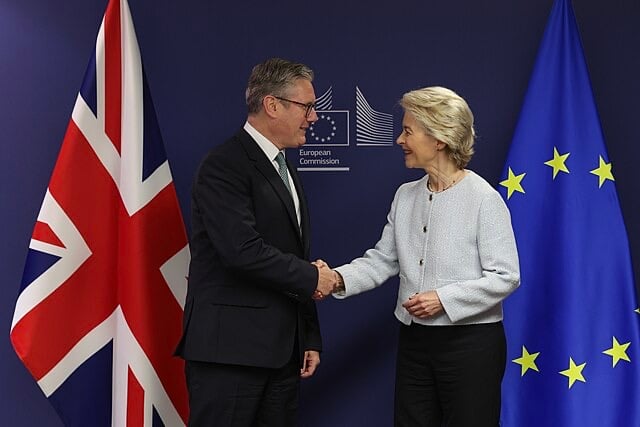The Background of the Brexit Reset Deal
In a landmark shift signaling a new era of UK-EU relations, Prime Minister Keir Starmer announced the Brexit “reset” deal on May 19, 2025, during a high-profile summit with European Commission President Ursula von der Leyen. The agreement, finalized after months of behind-the-scenes negotiations, is being hailed as a pragmatic step toward economic stability—but also condemned by critics as a massive political concession to Brussels.
The motivation behind this “reset” is rooted in years of trading friction, regulatory divergence, and diplomatic strain that followed the UK’s exit from the EU. Businesses and border agencies have struggled with cumbersome checks, delays, and uncertainty—especially concerning perishable goods and fishing access. Starmer’s Labour government, promising a more cooperative post-Brexit relationship, has now acted to address these problems. But the price for that smoother relationship has sparked a political firestorm.
Key Highlights of the Agreement
EU Fishing Rights Extended to 2038
Arguably the most controversial aspect of the agreement is the extension of EU fishing rights in British waters until 2038. Originally, these rights were set to expire in 2026, following a gradual post-Brexit reduction. Now, European fleets—particularly from France—have secured 12 more years of access, a move that UK fishing communities and Brexit supporters see as a betrayal.
Critics argue that this effectively reinstates elements of the EU’s Common Fisheries Policy, which was a major grievance during the Brexit campaign. Scottish and Cornish fishermen, in particular, say the government has surrendered critical leverage and that this will irreparably harm local economies. The government, however, claims the agreement removes the uncertainty of annual negotiations and includes a £360 million coastal investment fund to modernize the industry.
Simplified Trade Rules and SPS Check Reductions
In exchange for concessions like fishing, the UK won major wins on trade facilitation. A new permanent framework has been established to reduce checks on food and agricultural goods entering the EU. By aligning with certain EU sanitary and phytosanitary (SPS) standards, British exporters will benefit from a smoother, faster system for cross-border trade.
This alignment, however, comes with trade-offs. The UK will need to regularly update its standards to match those set in Brussels, raising concerns about being a “rule-taker” rather than an independent regulatory body. Yet businesses are optimistic. The Food and Drink Federation has praised the deal, projecting export growth of over 20% in affected sectors.
Youth Mobility Scheme in the Works
The agreement also opened doors to a proposed youth mobility scheme, which would allow 18-30-year-olds from the UK and EU to live, study, and work in each other’s countries for up to four years. While details are still being hammered out, the principle behind the scheme reflects a softer tone on migration and cultural exchange compared to the rigid systems implemented post-Brexit.
This move is welcomed by universities and student organizations but has stirred unease among those who campaigned to end freedom of movement. Some view it as a slippery slope toward reversing one of the central promises of Brexit.
UK’s Participation in EU Defense Projects
In a significant geopolitical pivot, the UK will now have access to the EU’s €150 billion defense fund. This opens the door for British firms and researchers to engage in joint European defense and security initiatives, boosting innovation and international collaboration.
While it strengthens UK-EU defense ties—especially important given global security threats—it also raises questions. Critics ask whether British taxpayers will ultimately foot the bill for European defense programs and what this means for independent defense strategy.
Reactions from Political Figures
Criticism from Conservatives and Reform UK
The political backlash was swift and fierce. Kemi Badenoch, Conservative Party leader, labeled the 12-year fishing concession as “an unforgivable capitulation,” emphasizing that it triples the access period the government originally proposed. Suella Braverman went further, stating that “this is a full surrender of UK waters.”
Reform UK’s Nigel Farage, a long-time critic of any EU-aligned deal, claimed, “If this is true, it marks the end of Britain’s fishing industry. We didn’t vote to leave the EU only to get rules dictated from Brussels.”
Support from Liberal Democrats and Business Groups
In contrast, Liberal Democrat leader Sir Ed Davey supported the move as “a necessary step to mend ties with Europe and strengthen the economy.” Business groups such as the Confederation of British Industry (CBI) and British Chambers of Commerce also welcomed the trade simplifications, citing long-awaited relief for exporters and importers.
The contrast in political response illustrates the central tension in post-Brexit policymaking—balancing sovereignty with pragmatism. For Starmer, the goal appears to be about creating economic resilience, even at the cost of symbolic concessions.



